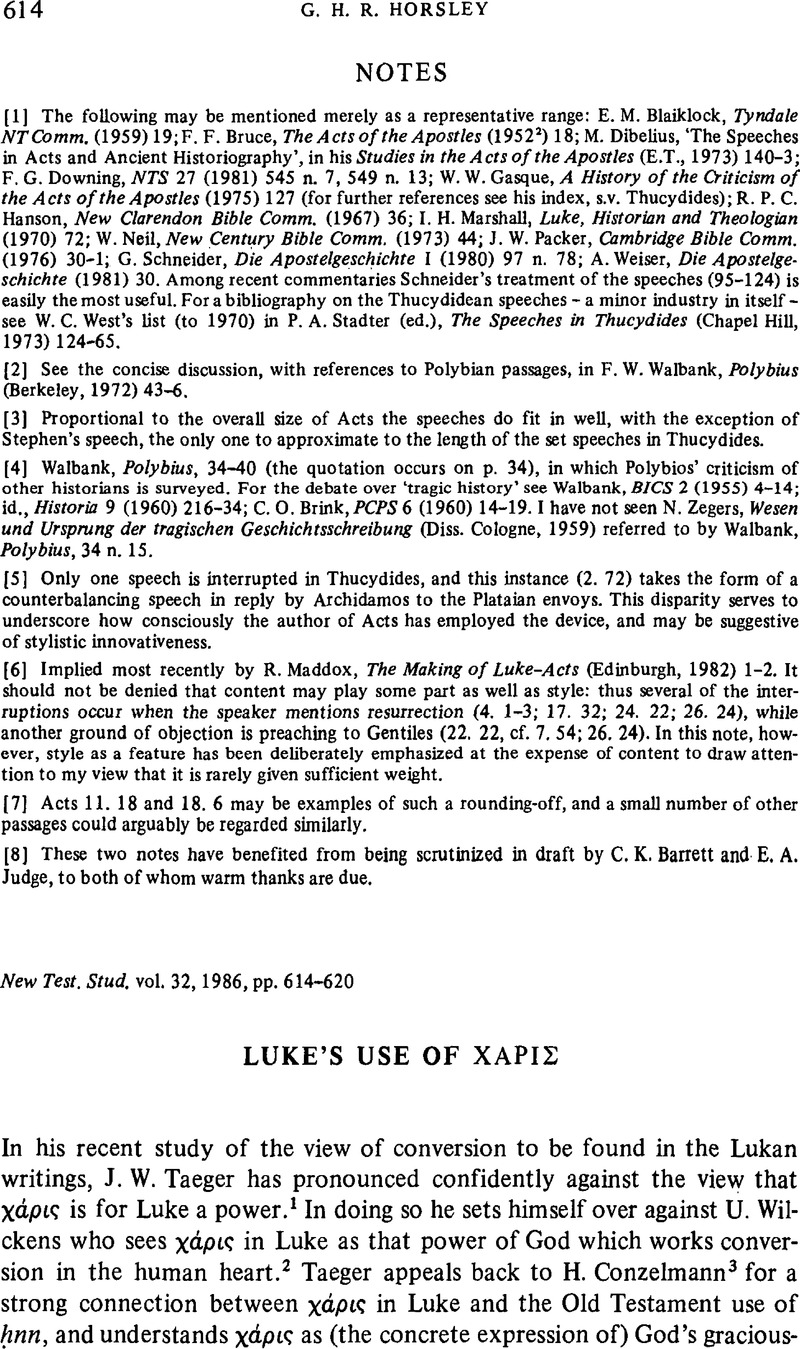
[1] Taeger, J. W., Der Mensch und sein Heil. Studien zum Bild des Menschen und zur Sicht der Bekehrung bei Lukas (Gütersloh, 1982) 221.Google Scholar
[2] Wilckens, U., Die Missionsreden der Apostelgeschichte. Form- und traditionsgeschichtliche Untersuchungen (Neukirchen, 3 1974) 184Google Scholar note 2.
[3] Conzelmann, H., χάρις κτλ., in T.D.N.T., vol. 9, 392 and cf. p. 376.Google Scholar
[4] Gils, F., Jésus prophète d'après les évangiles synoptiques (Louvain, 1957) 12–20.Google Scholar
[5] Dupont, J., Le Discours de Milet (Acts, xx, 18–36) (Lectio Divina 32; Paris, 1962) 103–5, 235–84.Google Scholar
[6] Cambe, M., ‘La XAPIΣ chez Saint Luc. Remarques sur quelques texts, notamment le KEXAPITΩMENH’, Revue Biblique 70 (1963) 193–207.Google Scholar
[7] This is partly to be attributed to the lack of focussed attention in the studies on the actual concept of χάρις involved. In each case the attention to χάρις is for the sake of something else.
[8] Wetter, G. P., Charis. Em Beitrag zur Geschichte des ältesten Christentums (Untersuchungen zum Neuen Testament 5; Leipzig, 1913).Google Scholar
[9] The major thesis of his study, including the view that such a use of χάρις is a late Hellenistic development, is accepted by Conzelmann, χάρις 376.
[10] See Wetter, , Charis, 209–11Google Scholar; Conzelmann, χάρις, 392.
[11] Πλήρης governs χάριτος καίδυνάμεως and is placed before. Mεγάλα governs τέρατα καί σημεīα and is placed after, and the τέρατα and σημεīα flow from the χάριτος and δυνάμεως (πλήρης … έποίει).
[12] It is possible that the tangibility of χάρις here becomes visibility in v. 15 where Stephen's face is like the face of an angel. Cf. esp. Homer, , Od. 6, 235–236Google Scholar (κατέΧευε Χάριν κεφαλ⋯ τε καί ![]() µοις,… καλλεϊ καί Χάρισι στίλβων) and Mart. Pol. 12.1 (τ⋯ πρόσωπον αὺτοū χάριτος έπληροūτο,
µοις,… καλλεϊ καί Χάρισι στίλβων) and Mart. Pol. 12.1 (τ⋯ πρόσωπον αὺτοū χάριτος έπληροūτο, ![]() στε… τ⋯ν άνθύπατον έκστ⋯ναι). The texts are quoted from the Loeb Classical Library editions.
στε… τ⋯ν άνθύπατον έκστ⋯ναι). The texts are quoted from the Loeb Classical Library editions.
[13] Haenchen, E. (The Acts of the Apostles (ET; Philadelphia, 1971) 279Google Scholar) notes the mismatch between σοφία and χάρις but it does not lead him to question the sense attributed to the latter.
[14] See Gen 39. 21; Ex 3. 21; 11. 3; 12. 36; Ps 84. 11. For a discussion of the usage of the Hebrew hn which lies behind χάρις here see Zimmerli, W., χάρις κτλ., in T.D.N.T., vol. 9, 379–81.Google Scholar In the Hebrew text, the transfer of hn from God to man is particularly clear in the use with suffix in Gen 39. 21.
[15] E.g. Holtzmann, H. J., Apostelgeschichte (HKNT 1/2; Tülbingen-Leipzig, 3 1901) 45Google Scholar; Conzelmann, χάρις, 392.
[16] See Blass, F., Debrunner, A., Funk, R. W., A Greek Grammar of the New Testament and Other Early Christian Literature (Chicago-London, 1961), 443(3).Google Scholar
[17] At Acts 2. 47 we are only explaining a juxtaposition, not a close grammatical connection.
[18] The repeated μεγάλ7eegr; fits well the χάρις being essentially the same as the δύναμις.
[19] Acts, 231.
[20] ibid., 231 note 4.
[21] The LXX adds only Sir 26. 15, χάρις έπί χάριτι γυνῂ αισχυντηρά, which is not really comparable.
[22] Thus Holtzmann, , Apostelgeschichte, 119Google Scholar; Loisy, A., Les Actes des Apôtres (Paris, 1920) 716Google Scholar; Beyer, H. W., Die Apostelgeschichte (NTD 2/5; Göttingen, 7 1955) 114–15Google Scholar; Conzelmann, H., Die Apostelgeschichte (HNT 7; Tübingen, 1963) 109Google Scholar; Stählin, G., Die Apostelgeschichte (NTD 5; Göttingen, 2 1966) 249Google Scholar; et al.
[23] See esp. Moffatt, J., Grace in the New Testament (London, 1931) 362Google Scholar. Of particular importance in determining the probabilities for the connection of χάρις is one's answer to the question: does ζέων πνεύματι refer to the Holy Spirit? As well as his own comments see the literature cited at Haenchen, Acts, 550 notes 7 and 8.
[24] Die Missionsreden, 184 note 2.
[25] Nolland, J., ‘Words of Grace (Lk 4, 22)’, Biblica 65 (1984) 44–60.Google Scholar
[26] Cf. Acts 14. 23; Lk 23.46 for this use of παρατίθημι by Luke.
[27] Cf. Cambe's comment re Acts 14. 3; 20. 24, 32 (XAPΣ 195) ‘Le message chrétien est I'annonce de la grâce faite par Dieu aux hommes, il la communique même aux croyants, car cette grâce est réellement présente dans la prédication et opère par elle.’
[28] RSV translation, supported by, e.g. Haenchen, , Acts, 446Google Scholar and Conzelmann, χάρις 392 note 160, who both refer to Blass, Debrunner, Funk, , Greek Grammar 397(2).Google Scholar
[29] See my ‘A Fresh Look at Acts 15. 10’, NTS 27 (1980) 105–15.CrossRefGoogle Scholar
[30] Blass, Debrunner, Funk, , Greek Grammar 390Google Scholar, 391(4). Cf. Lake, K. and Cadbury, H. J., The Beginnings of Christianity, Vol. 4 (London, 1933) 174Google Scholar, and Bruce, F. F., The Acts of the Apostles (London, 1952) 295.Google Scholar
[31] Der Mensch und sein Heil, 221.
[32] ‘Eκάθισεν αὺτῂν έπί τρίτου βαθμοῡ τοῡ θυσιαστηρίου, καί ἔβαλλε Kύριоς ⋯ θε⋯ς χάριν έπ’ αὺτήν, καί κατεχόρευε τοīς ποσίν αὺτ⋯ς, καί ήγάπησεν αὺτῂν πáς [⋯] οίκος Iσραήλ. Cited from the critical edition of de Strycker, E., La forme la plus ancienne du Protévangile de Jacques (Bruxelles, 1961).Google Scholar There are a number of variants but these do not materially affect the sense of χάρ7iota;ς.
[33] Cullmann, O. in E. Hennecke: New Testament Apocrypha (ed. Schneemelcher, W., ET ed. McL, R.. Wilson; London, 1963) 1, 327Google Scholar, suggests a date of about 150 AD.
[34] The obvious links between 2. 40 and 2. 52 should cause us to keep in mind that the presence of χάρις which is an endowment of power, is an indication of the χάρις which is the divine favour.